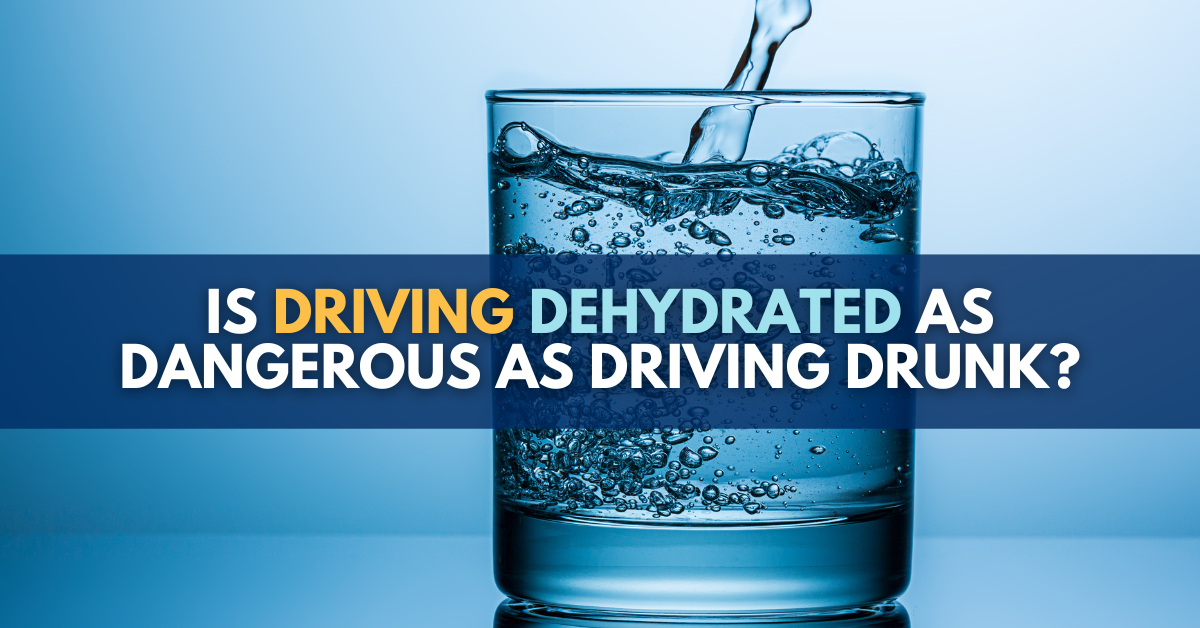A new study shows driving errors doubled (!) when driving dehydrated. This includes reduced concentration and alertness and judgment
Got water? If you are getting behind the wheel, that’s something you need to start to ask yourself — because driving dehydrated can have the same dangerous effects on a driver as driving drunk.
A study from Loughborough University in the U.K. and the European Hydration Institute found that a driver’s concentration, alertness and decision-making are reduced when not enough water is consumed beforehand.
It isn’t as surprising as you might first think. Hydration is critical to healthy brain function. Dehydration leads to immediate health problems, from headaches and fatigue to irritability and impaired short-term memory and judgment.
In other words, it makes sense.
Now that Michigan weather is getting hotter, it’s time to start thinking about drinking enough water — not just for your health, but also for your safety and for the safety of other drivers on the road.
Driving dehydrated led to double the errors in field study
The U.K. study was comprised of two groups, each of which were told how much or how little to drink the day before the driving test. On the day of the test, each participant in the more hydrated group was given approximately 7 ounces of water once every hour, while the other group’s participants were given less than 1 ounce every hour (reaching mild dehydration status).
The two-hour driving test was split into four 30-minute sections. Both groups made more and more driving errors as the test progressed, such as drifting, car wheels crossing the rumble strip or lane line, and late braking.
However, the dehydrated group’s errors were consistently higher than in the hydrated group’s — 101 compared to 47, respectively.
The dehydrated drivers also rated worse for feelings of thirst, throat dryness, hunger, concentration and alertness.
Further, the report said that the dehydrated group’s performance was comparable to driving with a blood alcohol concentration of 0.08% — the U.S. legal driving limit — or while sleep-deprived.
As the study’s leader, Loughborough Professor Ron Maughan, noted:
“We all deplore [drunk] driving, but we don’t usually think about the effects of other things that affect our driving skills, and one of those is not drinking and dehydration. There is no question that driving while incapable through drink or drugs increases the risk of accidents, but our findings highlight an unrecognized danger and suggest that drivers should be encouraged to make sure they are properly hydrated.”
Drink — and eat — to stave off driving dehydrated
So how much fluid does an average adult need daily? The National Academy of Medicine says that an adequate intake of total beverages a day is approximately 13 cups for men and 9 cups for women.
That sounds like a lot to ingest mentally and physically, but you need not just stick to water to reach that quota. Any kind of liquid-based drink, such as juice and milk and even soup, can keep you hydrated. Tea and coffee are OK, too — the caffeine amount does not discount the fluid in them as we always heard when growing up. Even though the caffeine produces a slight diuretic effect, it still counts as hydration according to the National Research Council’s Food and Nutrition Board.
Other ways to get more fluid into your system include:
- Water-filled vegetables including cucumbers, celery, bell peppers and carrots.
- Fruit such as apples, strawberries, watermelon, grapes and pineapple.
- Smoothies, which combine essential nutrients such as potassium and calcium as well as electrolytes (they’re also fun to drink).
As mentioned before, though, the easiest way to make sure you’re not driving dehydrated is to have something on hand in your car to drink. (Water is an ideal choice; not only does it do the job easily, it also won’t make a permanent mess if you spill some.)
You should take a sip or two any time you feel thirsty, even if you’re not feeling fully parched, as mild thirst is still a sign of impending dehydration.
Finally, if you’re someone who deliberately restricts drinking in order to avoid restroom stops on long road trips, I urge you to change your mindset. A 5-minute bathroom break is much better than the dangerous alternative.




